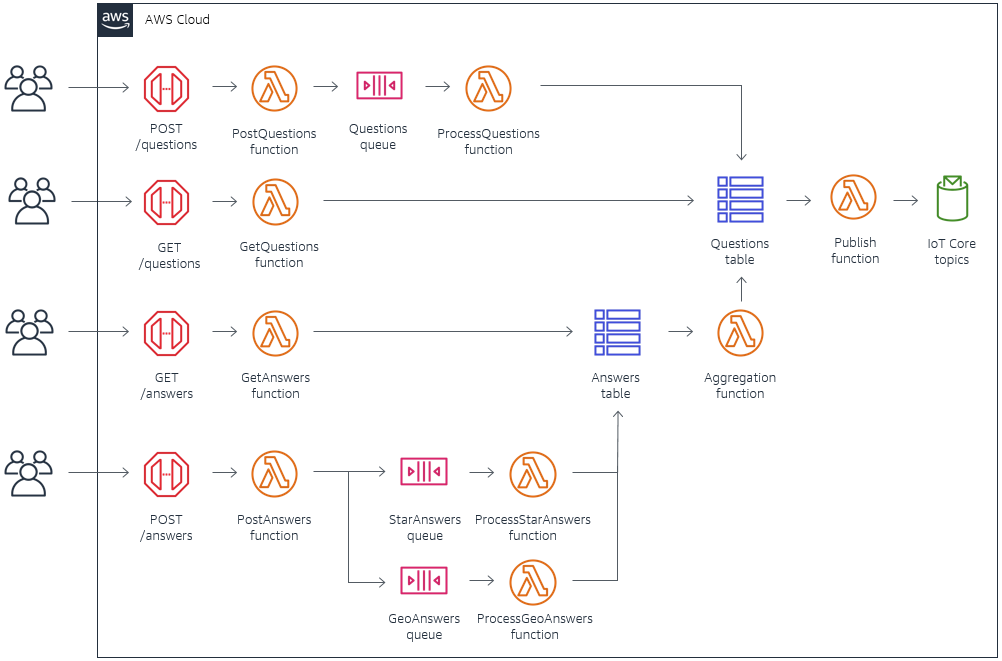AWS Compute Blog
Tag: nodejs
Node.js 14.x runtime now available in AWS Lambda
You can now develop AWS Lambda functions using the Node.js 14.x runtime. This is the current Long Term Support (LTS) version of Node.js. Start using this new version today by specifying a runtime parameter value of nodejs14.x when creating or updating functions or by using the appropriate managed runtime base image. Language Updates Node.js 14 is a […]
Building a location-based, scalable, serverless web app – part 3
In part 2, I cover the API configuration, geohashing algorithm, and real-time messaging architecture used in the Ask Around Me web application. These are needed for receiving and processing questions and answers, and sending results back to users in real time. In this post, I explain the backend processing architecture, how data is aggregated, and […]
Building a location-based, scalable, serverless web app – part 2
This post explores the backend architecture of the Ask Around Me application. I compare the cost and features in deciding between REST APIs and HTTP APIs in API Gateway. I introduce geohashing and the npm library used to handle geo-location queries in DynamoDB. And I show how you can build real-time messaging into your web applications using the publish-subscribe pattern with AWS IoT Core.
Creating a scalable serverless import process for Amazon DynamoDB
Amazon DynamoDB is a web-scale NoSQL database designed to provide low latency access to data. It’s well suited to many serverless applications as a primary data store, and fits into many common enterprise architectures. In this post, I show how you can import large amounts of data to DynamoDB using a serverless approach. This uses […]
Automating scalable business workflows using minimal code
In this blog post, I show how to use a serverless application to build and manage enterprise workflows at scale. This minimal-code solution is highly scalable and flexible, and can be modified easily to meet your needs.
Translating documents at enterprise scale with serverless
Developing a scalable translation solution for thousands of documents can be challenging using traditional, server-based architecture. Using a serverless approach, this becomes much easier since you can use storage and compute services that scale for you.
Node.js 12.x runtime now available in AWS Lambda
We are excited to announce that you can now develop AWS Lambda functions using the Node.js 12.x runtime, which is the current Long Term Support (LTS) version of Node.js. Start using this new version today by specifying a runtime parameter value of nodejs12.x when creating or updating functions. Language Updates Here is a quick primer that highlights […]
Node.js 8.10 runtime now available in AWS Lambda
This post courtesy of Ed Lima, AWS Solutions Architect We are excited to announce that you can now develop your AWS Lambda functions using the Node.js 8.10 runtime, which is the current Long Term Support (LTS) version of Node.js. Start using this new version today by specifying a runtime parameter value of nodejs8.10 when creating or […]
Going Serverless: Migrating an Express Application to Amazon API Gateway and AWS Lambda
Brett Andrews Software Development Engineer Amazon API Gateway recently released three new features that simplify the process of forwarding HTTP requests to your integration endpoint: greedy path variables, the ANY method, and proxy integration types. With this new functionality, it becomes incredibly easy to run HTTP applications in a serverless environment by leveraging the aws-serverless-express […]
How to turn Node.js projects into AWS Lambda microservices easily with ClaudiaJS
This is a guest post by Gojko Adzic, creator of ClaudiaJS While working on MindMup 2.0, we started moving parts of our API and back-end infrastructure from Heroku to AWS Lambda. The first Lambda function we created required a shell script of about 120 lines of AWS command-line calls to properly set up, and […]






